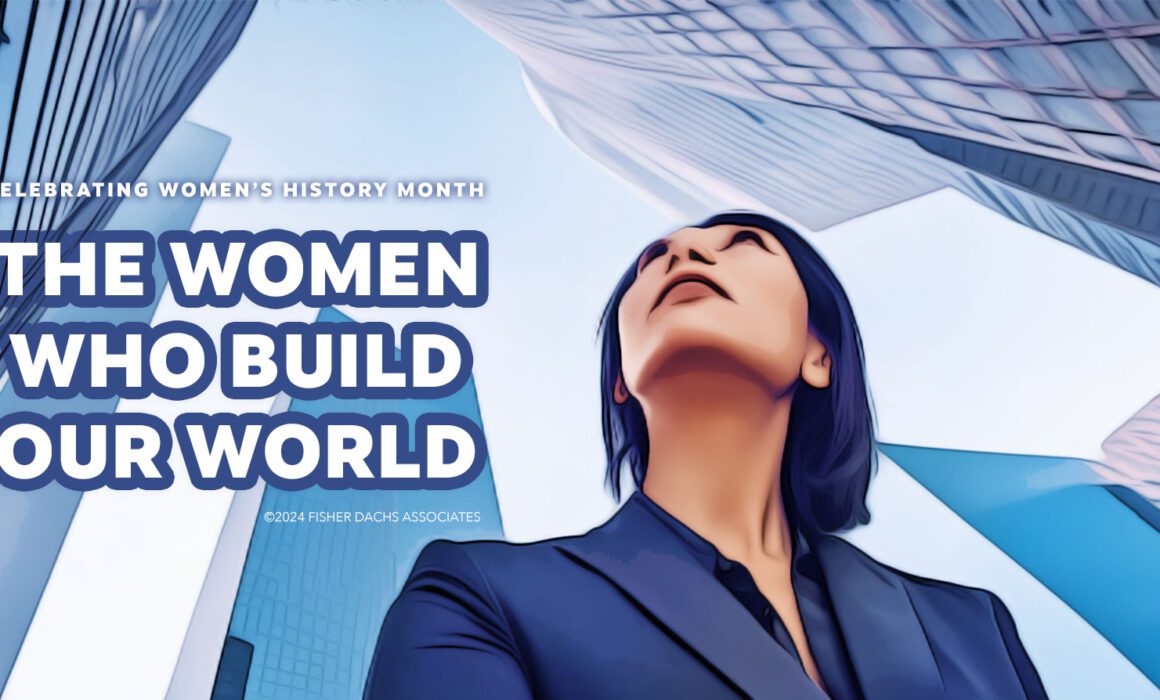The Women Who Build Our World – Celebrating Women’s History Month
When we celebrate Women’s History Month, we recognize the accomplishments and advancements of women in our society throughout centuries of injurious adversity in the face of structural and systemic setbacks, inequality, and injustice.
Not unlike the recent celebrations of Black History Month, yes, we have come a long way. Global perspectives and behavior are generally being steered in a more positive direction through advocacy and education, yet we continue to observe and experience ongoing and immediate prejudice and discrimination toward women both professionally and personally.
In almost every industry, especially in AEC, women are the architects of possibility, the engineers of resilience, and the builders of dreams. We celebrate the women who dare to wield the T-square, the slide rule, the mouse, and the hard hat. Regrettably, ours is a field predominantly comprised by men in positions of leadership, influenced exceedingly by men in stages of development and decision making.
It feels diminutive to say once a year to the women who shape our skylines, our infrastructure, places of gathering and community, and give rise to our future — we see you. We celebrate you. We stand on your shoulders. Your legacy is and becomes our shared reality. In a world built without women, our cities lack true empathy. Public spaces overlook the needs of mothers, daughters, and grandmothers. Safety, accessibility, and aesthetics are diminished. The exclusion of women stifles creativity, innovation, and progress.
Too often we solely rely on celebrating the exceptions to the rule in our industry. Zaha Hadid, the trailblazing architect and her fluid designs, like the Heydar Aliyev Center. Lina Bo Bardi and her advocacy for socially conscious design, transforming São Paulo’s urban landscape with the SESC Pompeia, the factory-turned-cultural center. Emily Warren Roebling, who oversaw the completion of the Brooklyn Bridge. Even fictitious but powerful symbols like Rosie the Riveter galvanized a tremendous workforce during wartime.
Despite the outliers, representation remains woefully uneven. Among professionals specializing in architecture and engineering, 27% identify as women1. While this represents progress, there is tremendous room to foster opportunities, growth, and improvement. In construction, women constitute 9.9% of the workforce, approximately 1,173,000 women2. This percentage is relatively low compared to other sectors.
The history of AEC is filled with remarkable contributions from women, even though their achievements were often overshadowed by their male counterparts. Furthermore, studies show that women in architecture still earn less than their male counterparts, even when controlling for experience and qualifications. Not only that, but the demanding nature of field work, with long hours and tight deadlines, can be particularly challenging for women who also shoulder childcare and household responsibilities. This can lead to career burnout and difficulty advancing to leadership positions. The underrepresentation of women at senior levels in the profession creates a limited support system for younger women. This can make it difficult to find mentors who can guide their careers and advocate for them.
The culmination of all these disparities often creates stereotypical expectations, with clients and colleagues potentially holding outdated stereotypes about women’s capabilities in the field. This leads to a lack of respect and trust in their professional skills and expertise.
The women who build our world are deserving of much more than this and our annual remembrances. They deserve to be made whole after a lifetime of inequities. They deserve the privilege to experience the same certainties and assurances, stability, safety, and security that the rest of male-dominated society inherently luxuriate in.
SOURCES
- Celebrating Women in Architecture, Engineering & Construction. https://workwithfocus.com/news/celebrating-women-in-the-architecture-engineering-and-construction-industry/. ↩︎
- Statistics – NAWIC.ORG. https://nawic.org/about-nawic/statistics/. ↩︎
Expand your knowledge and understanding with these resources
Suggested Reading
- Architecture: A Woman’s Profession by Tanja Kullack
- Breaking Ground: Architecture by Women by Jane Hall
- Building Women Magazine
- Constructive Feminism: Women’s Spaces and Women’s Rights in the American City by Daphne Spain
- The House That She Built by Mollie Elkman, illustrated by Georgia Castellano
- Making Space: Women and the Man Made Environment by Matrix
- We’ll Call You If We Need You: Experiences of Women Working Construction by Susan Eisenberg
- Where Are the Women Architects? by Despina Stratigakos
- Women in Engineering: Professional Life edited by Margaret E. Layne, P.E.
- Women in Engineering: Pioneers and Trailblazers edited by Margaret E. Layne, P.E.
- Women in Green: Voices of Sustainable Design by Kira L. Gould and Lance Hosey
- Women in Hard Hats by Jenny Bailey
- Women of Steel and Stone by Anna M. Lewis
- The Women Who Changed Architecture by Sarah Allaback, Julie Sinclair-Eakin, Katherine Flynn, and Laurel Frances Rogers
Resources
Organizations
- Association for Women in Architecture + Design
- Black Females in Architecture
- Black Women in Architecture
- IEEE Women In Engineering
- Society of Women Engineers
- Women of Color in Engineering Collaborative
- National Association of Black Women in Construction
- National Association of Women in Construction
- Professional Women in Construction
If you enjoyed reading this article, subscribe to our monthly eDigest for more.

